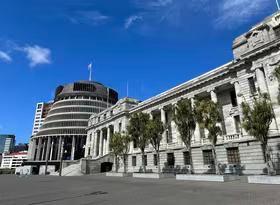Giving credit control to the government
Economic downturns are never pleasant events, yet it is the booms that often generate the destructive power of the downturns. The combination of sales growth and easy credit promotes an investment boom that further fuels economic growth. The problem with easy money is that too many investment ideas get financial backing. Everything looks like a winner, and the more cautious investors look like mugs. Although fewer frivolous investment mistakes are made during the downturns, excessive caution causes the damage of missed opportunities. Part of the solution to avoiding the worst problems associated with economic downturns is maintaining the discipline and so containing excesses during the good times.
It may be time to re-look at an old idea that would revolutionise the banking system by separating the monetary and credit functions of the banking system. Promoted by American intellectuals like Henry Simons and Irving Fisher during the Great Depression of the 1930s, the so-called Chicago Plan called for the 100% backing of bank deposits by government-issued money and ensuring that the financing of new bank credit could only take place through earnings that have been retained in the form of government-issued money or through the borrowing of existing government-issued money from non-banks. Crucially, the approach would remove the ability of banks to leverage the creation of money by lending money in excess of their deposits. In other words, banks would become pure intermediaries that depend on obtaining outside funding before being able to lend.
The proponents of the Chicago Plan claimed four major advantages:
- Having to obtain outside funding rather than being able to create it themselves would reduce the ability of banks to cause business cycles due to potentially capricious changes in their attitude towards credit risk.
- Having fully reserve-backed bank deposits would completely eliminate bank runs, thereby increasing financial stability and allowing banks to concentrate on their core lending function without worrying about instabilities from the liabilities side of their balance sheet.
- Allowing the government to issue money directly at zero interest, rather than borrowing that same money from banks at interest, would lead to a reduction in the interest burden on government finances.
- Allowing a reduction in private debt levels as money creation would no longer require the simultaneous creation of mostly private debts on bank balance sheets.
A recent IMF Working Paper investigated the veracity of the claims for the Chicago Plan with use of a state of the art monetary dynamic stochastic general equilibrium model of the US economy. They found strong support for all of the claims, with a Chicago Plan banking system likely to result in “much smoother business cycles, no possibility of bank runs, a large reduction of debt levels across the economy, and a replacement of that debt by debt-free government-issued money” (p6).
Further the authors, Jaromir Benes and Michael Kumhof, claim that their modelling indicates two additional advantages of the Chicago Plan:
- It generates long term output gains from a lower interest rate profile, lower tax rates (as the government can earn more from seigniorage), and lower credit monitoring costs for banks.
- It can allow steady state inflation to drop to zero without posing problems on the conduct of monetary policy. A critical underpinning to this result is the greater ability to avoid liquidity traps as the quantity of broad money would be directly controlled by policy makers and not dependent on bank’s willingness to lend, and because the interest on Treasury credit would not be an opportunity cost of money for asset investors, but rather a borrowing rate for a credit facility that is only accessible to banks for the specific purpose of funding physical investment projects, it could become negative without any practical problems.
These are pretty heady claims. It smacks of “if it sounds too good to be true, …”. However, there are many other examples of low lying fruit in the policy domain where a combination of entrenched interests and innate conservatism inhibits movements to welfare enhancing changes (eg a flat tax/guaranteed minimum income tax benefit system, redesigning GST on a origins basis, and global free trade). The claimed benefits of adopting the Chicago Plan are truly profound, and if true would have a larger impact on the welfare of New Zealanders than most other issues that dominate political debate. It would seem to be a good use of government resources to have this issue investigated thoroughly to, either put to bed the claims if they are illusory or to begin implementing a change if they are indeed genuine. Some potential areas of investigation would be to see whether there are:
- any foreign exchange ramifications,
- issues around whether New Zealand could unilaterally adopt such a system or whether it would first require adoption in a major currency areas (eg US or the Euro zone), and
- risks that government management (or the Reserve Bank as its agent) actually result in increased instability or other problems.




